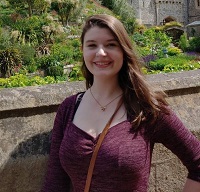
What is your major and class standing?
I’m currently majoring in Film on the Writing and Directing track, with minor in Political Science with an emphasis on International Politics. This is my first semester of university life, and though Covid-19 has certainly complicated the experience, I can’t wait to see what this academic year brings!
In addition to this CEEP Democracy Fellowship, how else are you involved on CSU's campus?
Since I’m only just getting started at CSU, I haven’t had the opportunity to become involved with all the variety of clubs, organizations, and activities that the university provides. I am, however, hoping to get involved with organizations such as the CSU Democrats, the Cauldron, and/or the Vindicator.
In what ways have you been involved in your community, past and present?
Growing up in Chardon OH, I was always very involved in my community’s local theater. Through this experience, I met a variety of different people, from a myriad of backgrounds and experiences. This exposed me to lots of unique and expansive opinions, many of them regarding politics and social issues. This helped form in me the same passion and drive for understanding and shaping America’s democracy that inspired me to become involved in OCE’s CEEP Fellowship. I hope that this experience can help expose me to even more new people with even more unique ideas and opinions.
What would you say to someone who tells you their vote does not matter?
There’s a popular belief in this day and age that a single vote doesn’t hold any weight in a democracy, and there have certainly been plenty of studies and debate over whether or not this is true. While this will continue to be under scrutiny and speculation for years to come, it is absolutely impossible to deny that the easiest and most direct way that a person can interact with their democracy is through voting. Oftentimes, it is hard to make waves as a civilian when it comes to the government, even when there is true passion driving a desire to change how policies and legislature function. Voting, however, will always be a guaranteed way to ensure that an individual’s personal beliefs are listened to, recorded, and used to affirm that they are properly represented by their government. Yet, for some reason, our generation seems hesitant to head to the polls. Regardless of your opinions on the outcome of the 2016 election, it is undeniable that the group with the lowest turnout was young voters. That is an entire generation that willingly chose to deny themselves the opportunity to choose who will represent them in Congress, to make decisions on local issues that could affect their everyday life, and even choose the leader of their nation. If this generation were to vote on the issues that they feel passionate about today, then we could have a collective voting power that certainly makes a difference in an election.
Why do you believe it is important for young people to be civically engaged citizens?
The decisions that are made in Washington, do not shape the future of the politicians who make these laws-- it shapes our futures. This is why it is so necessary to understand what exactly is happening in all areas of the government, on state, local, national, and even international levels. If young voters are vigilant enough to stay on top of legislative changes today, then they can actively participate in shaping a future that they’d like to live in.
What suggestions would you give someone who is wondering how to remain or get involved in the civic process during the ongoing COVID-19 pandemic?
While it’s harder to go out and participate in the social activities that used to be easily available, there’s still certainly plenty that can be done to become involved in the civic process. For example, being stuck at home provides a great opportunity to spend some time doing plenty of effective research on the issues that fill a person with passion. Having a deep understanding of various social issues, especially an understanding that not only affirms an individual’s opinions, but also looks at it from multiple differing points of view, is necessary to learning how to best approach the issue from a sensible method that is likely to encourage change. It is also still possible to stay up-to-date on what legislature is passing through Congress and contacting your representatives on the issues at hand.
What makes you optimistic about the future?
There’s so many reasons to be optimistic about the future-- one of the most visible is the fact that student activism, now more than ever, has become such a huge part of life in 2020. The community participation, understanding, mutual respect, and empathy demonstrated between people in the aftermath of the torrential events of 2020 prove that there are always people willing to make life more bearable-- both in the present, and the future. People are more willing to call in and check up on friends now that COVID has made in-person contact more difficult. People are paying more attention to the DNC and RNC, asking questions about how the decisions made today will shape how our country will look years down the line. Finally, and most importantly, people are taking the time to stand up and participate in community activism for the sake of shaping a more just America.
Want to learn more about democracy fellowships? Contact Anita Ruf-Young, Program Coordinator and Interim Director of OCE at a.rufyoung@csuohio.edu.

